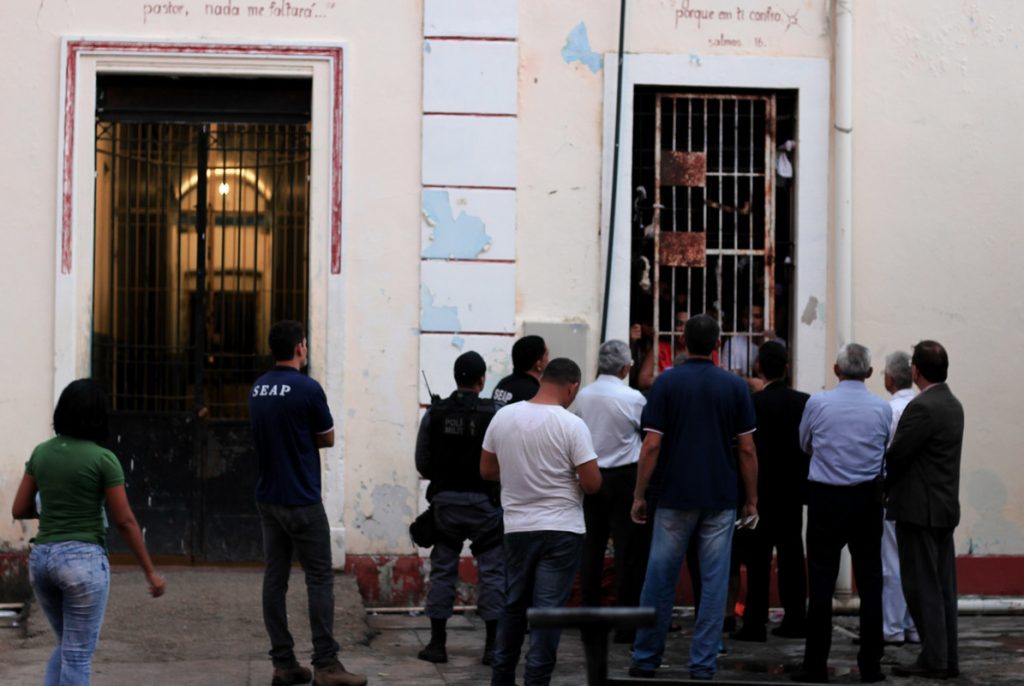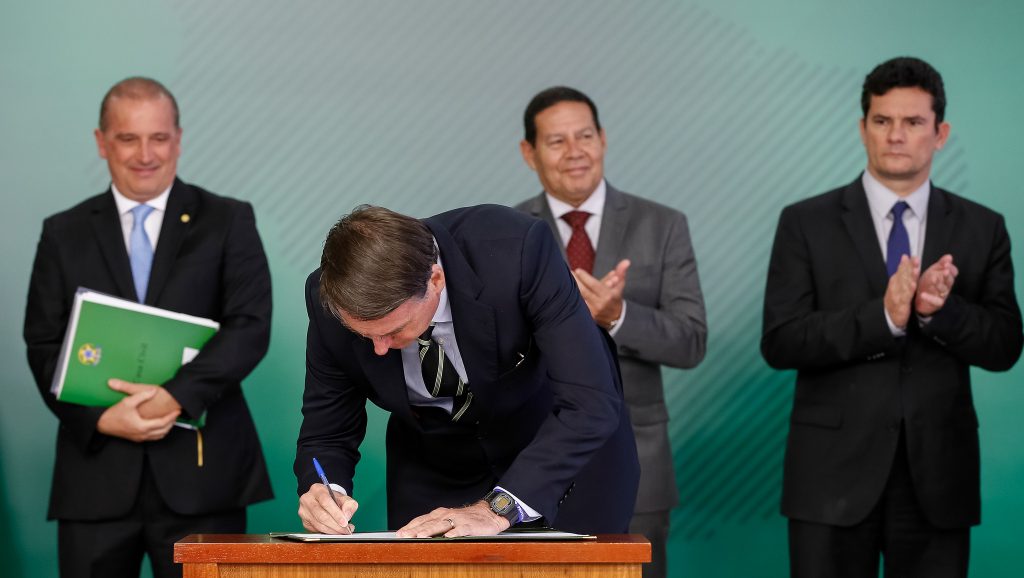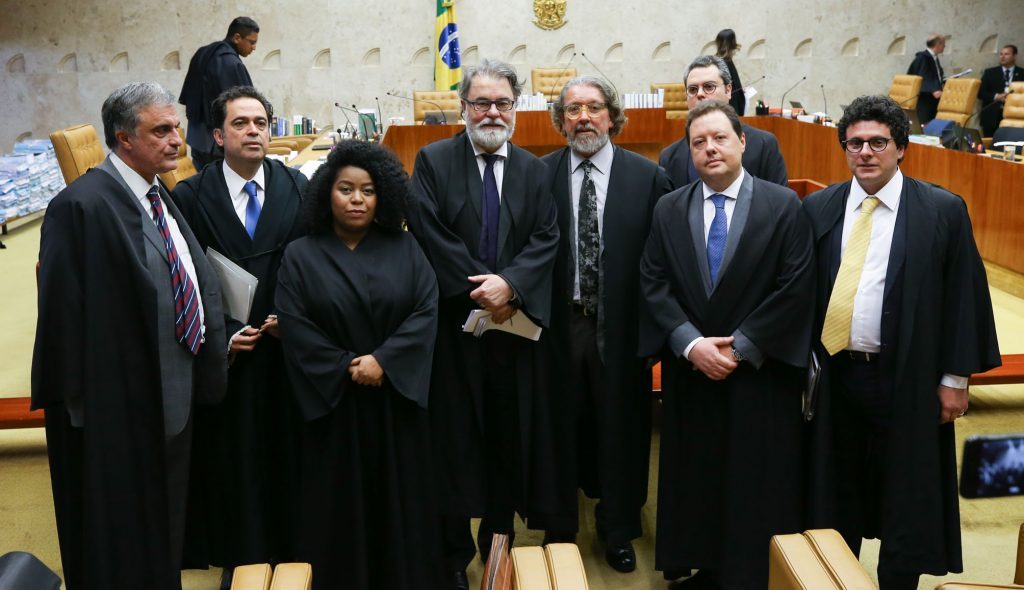Retrospective: human rights in 2019
See a selection of fifteen important issues addressed by Conectas this year
 Assinatura solene de decreto sobre posse de armas
(Brasília - DF, 15/01/2019) Presidente da República, Jair Bolsonaro assina decreto.
Foto: Alan Santos/PR
Assinatura solene de decreto sobre posse de armas
(Brasília - DF, 15/01/2019) Presidente da República, Jair Bolsonaro assina decreto.
Foto: Alan Santos/PR
The year 2019 was a very challenging one for the work of civil society and for those that defend the rule of law. From the first day of the government of President Jair Bolsonaro, we have endured attempts to restrict and control the work of NGOs, to criminalize human rights defenders, to suppress rights, to weaken the protection of forests and their ancestral peoples and to establish more hardline criminal policies. On the other hand, civil society has shown resilience and the capacity to react to remedy or block many of the most authoritarian measures. Conectas has been on the front line in the National Congress, in the Supreme Court and in the United Nations, always responsive to violations and influencing important political actors in the defense of fundamental rights and democracy.
See below a retrospective of the main issues addressed by Conectas in 2019:
1. Provisional Executive Order to Control NGOs
Read more

The first working day of the Bolsonaro government saw the introduction of a provisional executive order putting into practice his campaign promise of “ending all forms of activism”. Published on January 2, Provisional Executive Order No. 870/2019 gave the Secretary of Government of the Presidency of the Republic the authority to “supervise, coordinate, monitor and observe the activities and actions of international bodies and non-governmental organizations in the national territory”.
Civil society successfully influenced the passage of the measure in the National Congress and managed to overturn the article that guaranteed the control of organizations by the State. After exerting strong pressure, the joint commission analyzing the matter decided to remove from the Secretary of Government the power to monitor the activity of non-governmental organizations.
2.Mining

The first days of the year were marked by an unprecedented environmental and social disaster. On the afternoon of January 25, the bursting of a dam in the region of Brumadinho, in the state of Minas Gerais, caused the death of more than 252 people and the disappearance of another 13.
The occurrence of another dam-related disaster brought back memories of the Doce River tragedy, which occurred 4 years ago on November 5, when victims and families this year staged symbolic acts in protest against the failure to make reparations for physical and moral damages.
The sequence of disasters led the mining company Vale to withdraw from the UN Global Compact, the world’s largest corporate social responsibility framework, and prompted victims from the two disasters to cross the Atlantic to tell their stories at a series of meetings with mining sector shareholders, civil society organizations and the press in England.
Over the course of this period, Conectas closely followed the discussions on the General Licensing Bill (no. 3,729/2004) and participated in the debates of the Working Group set up in the Lower House of Congress to discuss the topic. The breach of the agreement with civil society by the rapporteur of the Bill, who presented a new text containing serious setbacks in environmental licensing, was denounced by nearly ninety civil society organizations, which demanded that this important national environmental policy instrument be preserved.
3. Brazil withdraws from UN Global Compact for Migration

Also at the start of the year, Brazil announced its withdrawal from the UN Global Compact for Migration. The agreement, which addresses questions such as how to effectively protect migrants and how to integrate them into society, has been criticized by representatives of the far-right around the world, such as the Prime Minister of Hungary, Viktor Orbán, and the Deputy Prime Minister of Italy, Matteo Salvini.
When announcing Brazil’s withdrawal, Foreign Minister Ernesto Araújo said that the international compact is an “inadequate instrument” for addressing the issue of migration and that countries should set their own policies. Brazil has now joined the United States, Israel, Hungary and Austria, which have also withdrawn from the agreement.
4. Rio de Janeiro hits record in killings by the police

The number of people killed by police action in the state of Rio de Janeiro increased in 2019 to the highest level in two decades. By October, according to the Public Security Institute, a total of 1,546 people had been killed by the police.
The rise in homicides caused by agents of the State coincides with the introduction of tougher public security policies on the state and federal level. Rio de Janeiro Governor Wilson Witzel, just like President Jair Bolsonaro, publicly defends that police officers should shoot to kill.
Witzel’s actions have been harshly criticized by civil society and questioned by international bodies such as the United Nations and the OAS. After the 8-year-old girl Ágatha Félix became the fifth child to be killed by gunfire in the state this year, the governor was also the target of a complaint in the UN Human Rights Council.
5. Deforestation and fires in the Amazon

The Bolsonaro government assigned the Ministry of Agriculture the responsibility for the demarcation of indigenous lands, while reaffirming its intention to suspend and reverse the demarcation process. Fortunately, the move was later overturned and the responsibility was returned to the Ministry of Justice.
The Brazilian government’s policies to dismantle legislation and environmental inspection agencies were denounced to the G7, the group made up of the world’s seven most developed countries. The Brazilian indigenous leader, Kayapó Raoni Metuktire, personally delivered the letter to the French president, Emmanuel Macron, after the G7 summit. The document asserted that the environmental crisis in the Amazon had worsened and it called on the countries of the group to adopt measures to tackle the deforestation and fires in the region.
At the COP 25 (United Nations Conference on Climate Change), one of the largest climate events in the world, Conectas launched the Climate Litigation Guide produced in partnership with the Institute for Climate and Society, containing successful cases of litigation on climate issues that have already been carried out in different parts of the world.
6. Violation of international treaty against torture

In June, President Jair Bolsonaro dismissed, by decree, all the experts serving on the MNPCT (National Mechanism to Combat and Prevent Torture), the body responsible for investigating rights violations in detention facilities, such as prisons, psychiatric hospitals and old people’s homes.
The decree that changed how the body works established that new legal advisors should no longer receive payment. At the time, the Inter-American Commission on Human Rights, a body of the OAS, expressed condemnation and concern over the dismantling of the MNPCT and declared that the decree is a threat to the independence of prison inspection agencies.
In August, the federal courts upheld an injunction that ordered the reinstatement of the 11 experts and ensured their payment.
In December, the United Nations Subcommittee on Prevention of Torture accused the Brazilian government of breaching a UN treaty on combating torture.
7. The ups and downs of gun policy

Between the months of January and August, President Jair Bolsonaro signed a total of eight decrees intended to expand and relax the rules on gun ownership and carry in Brazil – many of them conflicting with the Disarmament Act, which has regulated the use of firearms in the country since 2003. One of his main platforms during the presidential campaign, his gun policy was also voted in the Senate, with an executive bill that, among other things, authorized the use of more powerful firearms by civilians.
8. Supreme Court denies extradition of Turkish citizen

The Second Chamber of the Supreme Court unanimously vetoed the extradition request of the Brazilian-naturalized Turkish citizen, Ali Sipahi. Sipahi has lived in Brazil for 12 years and was taken into custody in April at the request of the Turkish government, which accused him of “supporting and being a member of a terrorist group”, the classification given by President Erdogan to the Gulen Movement founded by one his government’s opponents.
Conectas played an important role in the trial of the case, since it was admitted as an amicus curiae (friend of the court) and gave an oral statement on the day of the trial explaining that it was a case of political persecution by the Turkish government and that the Brazilian Migration Law prohibits extradition to countries whose court system is compromised and incapable of providing a fair and impartial trial.
9. Murder of rights defenders and criminalization of NGOs

At least 20 environmental and human rights defenders were murdered in Brazil in 2018, according to the report “Enemies of the State” published by the NGO Global Witness. Although it was the first time since 2012 that the country did not top the list of the most dangerous places for this type of defender, the year was marked by the murder of indigenous leaders such as Emyra Wajãpi. In May, Conectas denounced rights violations by the Brazilian government against indigenous peoples at a hearing staged by the Inter-American Commission on Human Rights.
At a meeting of the Mercosur, more than 40 organizations expressed their condemnation over the criminalization of the NGO Projeto Saúde e Alegria (Health and Happiness Project) and the arrest of four firefighters in Alter do Chão. The institutions also denounced to the United Nations and the Inter-American Commission on Human Rights the lack of transparency of the investigations and requested the support of international actors to spotlight the recent attacks on the work of civil society and the ongoing attempts to criminalize human rights defenders by Brazil’s current government.
10. Oil contamination in Northeast Brazil

In the second half of the year, an oil spill of unknown origin reached the coast of several states in the country, primarily in the Northeast region. At the time, regions that were already suffering from the impacts of the development model, such as the city of Cabo de Santo Agostinho, in the state of Pernambuco, where the Port of Suape is located, were also affected by the oil spill.
Conectas, in partnership with other local and international organizations, submitted an urgent appeal on the topic to UN rapporteurs and accompanied the visit to the site by Baskut Tuncak, UN special rapporteur on toxic wastes.
11. Attempts to weaken the Migration Law

The year 2019 was marked by an ongoing offensive by the federal government to undermine rights acquired by migrants and refugees in recent years. In July, Minister Sérgio Moro signed Ministerial Order 666, which permitted the summary deportation of “dangerous individuals”.
Criticized for its arbitrariness and for violating the rights established by the new Migration Law, the ministerial order was endorsed through an amendment to a legislative bill (Bill 1928/2017) presented in the Federal Senate, at the request of the minister himself, that modified the law and set harsher rules for entry and permanency of migrants in the country.
After strong pressure from the civil society organizations accompanying the case, the bill was shelved. Ministerial Order 666 was replaced by a new document, Ministerial Order 770, which omitted some of the more critical points, such as summary deportation, but was still harshly criticized by the organizations.
12. Brazil elected to the UN Human Rights Council

In 2019, the United Nations Human Rights Council, the inter-governmental body for the promotion and protection of human rights around the world, renewed some of its seats for the 2020-2022 term. The two seats available to GRULAC (Latin America and Caribbean Group) were disputed by Venezuela, Costa Rica and Brazil.
Ahead of the elections, Conectas spoke out against the choice of Brazil to hold a seat, given the ongoing rights violations committed by the Brazilian State over the course of the year, and it called on other countries from the group to run for the position in order to encourage competitive elections. Brazil ended up being elected for a new three-year term. After the reelection, Conectas reiterated that it will continue to monitor and denounce positions adopted by Brazilian diplomacy that disrespect human rights and violate constitutional principles.
13. São Paulo arrests 154 people per day for drug trafficking

Data from the Civil Police reveal that 154 people are arrested every day in the state of São Paulo on drug trafficking charges. The figure was obtained by the news channel GloboNews after a freedom of information request and it indicates that the number of people detained for trafficking has increased 21% over the past two years.
In November, Conectas launched the report “Prison at any cost”, which illustrated that mass incarceration would be less of a problem if the courts took into account one of the main mechanisms for reducing these types of sentences: what is legally known as ‘privileged trafficking’.
The research shows that the São Paulo justice system defines drug trafficking as a heinous crime even in cases when the defendant is a first-time offender and not involved with criminal organizations, going against the understanding of the Supreme Court.
Brazil currently has nearly 200,000 people in prison for crimes related to the sale of drugs.
Another important contributor to decarceration, the decriminalization of drugs for personal use found its way onto the agenda of the Supreme Court twice in 2019. The court discussion on decriminalization began in 2015 but was adjourned by the then court justice Teori Zavascki and had been expected to be resumed in June this year. However, the case was postponed by Chief Justice Dias Toffoli until November and later suspended indefinitely.
14. Supreme Court overturns imprisonment after first appeal

The rules governing when convicted prisoners must start serving their sentences changed on November 7, 2019. At the time, the Supreme Court decided to review the possibility of imprisonment after loss of first appeal, changing the rule in place since 2016 that violated the principle of the presumption of innocence enshrined in article 5 of the Brazilian Constitution.
On the first day of the court session, the plaintiffs and other interested parties advocated in favor of imprisonment only after all possibilities for appeal have been exhausted. Conectas was represented by its advocacy advisor Silvia Souza, who was the only black woman to make an oral argument at the judgment.
15. “Anti-Crime Bill” approved in the National Congress







